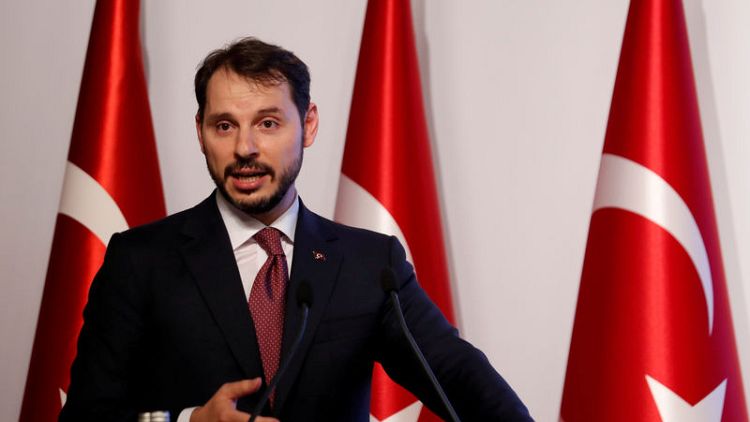By Humeyra Pamuk
ISTANBUL (Reuters) - Facing Turkey's gravest currency crisis since 2001 in his first month in the job, Finance Minister Berat Albayrak has the daunting task of reassuring global investors that the economy is not hostage to political interference.
As a former corporate executive with a PhD in finance, a hands-on approach and willingness to listen to contrary views, Albayrak, 40, is well equipped for the job, according to Turkish academics and newspaper columnists who attended a briefing with him in July.
The lira has lost nearly 40 percent against the dollar this year and crashed to a low of 7.24 on Monday, though it then rebounded and hovered at around 6 to the dollar on Wednesday.
A key test looms for Albayrak on Thursday when he holds a conference call with 3,000 investors and economists.
Though confident and articulate, he faces a credibility challenge because the man who appointed him, President Tayyip Erdogan, is also his father-in-law who has contributed to the lira's slide with his relentless calls for lower interest rates despite soaring inflation.
Albayrak must convince jittery markets that Turkish monetary policy will be determined by economic reality - and an independent central bank - rather than the powerful family chief behind his meteoric rise.
Economists attributed the lira's modest recovery on Wednesday to central bank measures which squeezed lira liquidity, raising borrowing costs without hiking the benchmark interest rate.
Albayrak's public statements have so far had less success.
Last Friday, from a hall in the ornate Ottoman-era Dolmabahce palace on the shores of the Bosphorus, he outlined the government's new economic plan in a powerpoint presentation to bankers and business leaders.
He promised central bank independence, tighter budget discipline, structural reform and "sustainable and healthy growth". But the lack of detail or clear action worried markets.
"The issue here is that he lacks credibility," said Piotr Matys, an emerging markets strategist at Rabobank. "The market doesn't want to give him the benefit of the doubt".
RAPID RISE
Reuters spoke to five people who had participated in discussions with Albayrak about Turkey's economy.
Kerem Alkin, an economics professor and a writer at the pro-government newspaper Sabah, described him as "energetic and open to all kinds of opinions".
"He only made a short introductory speech and took notes tirelessly for two and a half hours... He welcomed opinions from people not close to the government," Alkin said.
Albayrak, married to Erdogan's daughter Esra, studied banking and finance in the United States and worked for Turkish conglomerate Calik Holding, seen as close to Erdogan's ruling Islamist-rooted AK Party, rising to become chief executive officer before entering politics three years ago.
Within months he was elevated to the cabinet as energy minister. In July, after Erdogan was re-elected with sweeping new executive powers, the president named him to head the newly established Treasury and Finance Ministry, putting him in charge of a portfolio previously divided between two ministers.
The lira lost nearly 3 percent within minutes, as investors fretted over the departure from the cabinet of former deputy prime minister Mehmet Simsek and former finance minister Naci Agbal, both seen as market-friendly figures in a country pursuing increasingly unorthodox economic policies.
"The big strike against him is his being Erdogan's son-in-law," said Paul McNamara, an investment director at GAM London Limited. "Even if he was the best man for the job, the optics are Third World."
Under the constitutional changes that took effect after the July election, the post of prime minister has been scrapped, further narrowing the circle of influence around Erdogan, a man who has dominated Turkish politics for 15 years.
The last time Turkey's Central Bank held an emergency meeting to raise interest rates, three months ago, it took the intervention of then-prime minister Binali Yildirim to convince Erdogan of the need for drastic action.
Persuading Erdogan, who has branded interest rates the "mother and father of all evil", of the need for additional hefty rises in borrowing costs would be a tall order for Albayrak, even if he himself were convinced of the case.
Erdal Saglam, a columnist for Hurriyet newspaper who attended a July briefing with Albayrak, said the minister's thinking was "closer to the market" than many people imagine.
"But given his situation (as Erdogan's son-in-law), how much room he has to manoeuvre in implementing what he has in mind is difficult to gauge," he told Reuters.
Albayrak has echoed Erdogan's assertion that the currency crisis is the result of an "economic war" rather than Turkey's pursuit of economic growth and cheap credit.
The lira's steady slide this year accelerated sharply last week as a long-running dispute with Washington plunged into deeper acrimony and President Donald Trump doubled U.S. tariffs on Turkish metals exports. On Wednesday Turkey retaliated by doubling tariffs on some U.S. imports.
Saglam said Albayrak had indicated he would refrain from commenting on a daily basis on monetary policy and foreign exchange matters.
Instead, he has emphasised longer-term goals aimed at taming inflation while maintaining growth - to the frustration of some.
In his economic presentation last Friday "he was dealing with the right issues" but was still talking about future action, said Guillaume Tresca, senior emerging markets strategist at Credit Agricole.
"But it's too long. We need something right now."
(Additional reporting by Claire Milhench in London; Editing by Dominic Evans and Gareth Jones)



